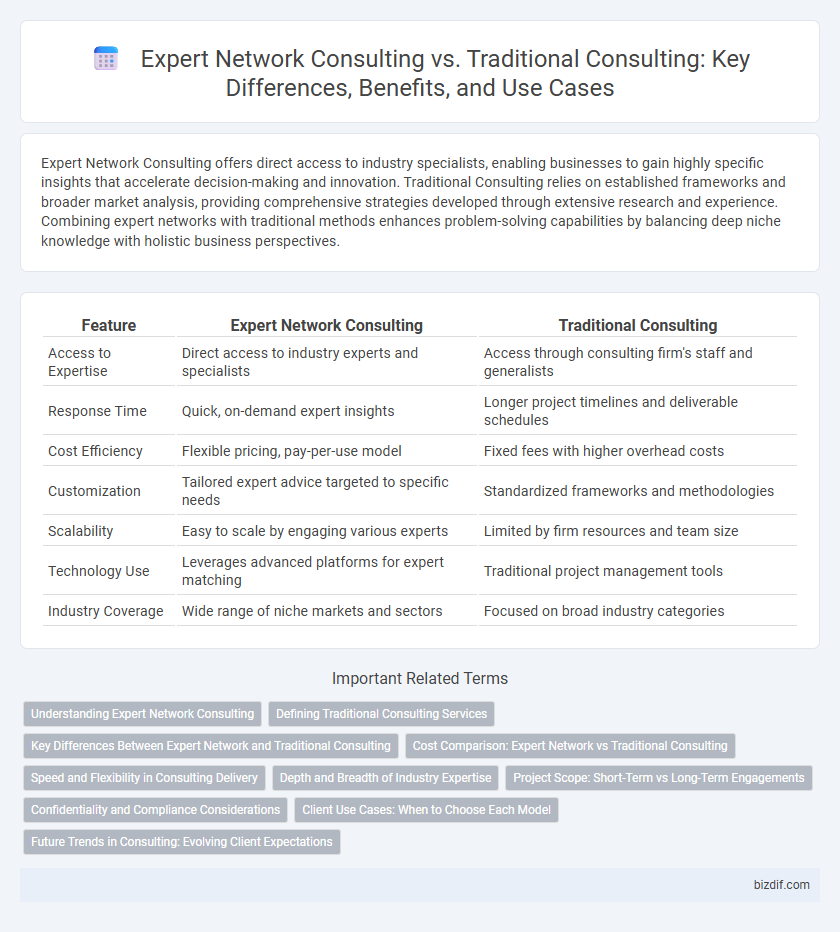Expert Network Consulting offers direct access to industry specialists, enabling businesses to gain highly specific insights that accelerate decision-making and innovation. Traditional Consulting relies on established frameworks and broader market analysis, providing comprehensive strategies developed through extensive research and experience. Combining expert networks with traditional methods enhances problem-solving capabilities by balancing deep niche knowledge with holistic business perspectives.
Table of Comparison
| Feature | Expert Network Consulting | Traditional Consulting |
|---|---|---|
| Access to Expertise | Direct access to industry experts and specialists | Access through consulting firm's staff and generalists |
| Response Time | Quick, on-demand expert insights | Longer project timelines and deliverable schedules |
| Cost Efficiency | Flexible pricing, pay-per-use model | Fixed fees with higher overhead costs |
| Customization | Tailored expert advice targeted to specific needs | Standardized frameworks and methodologies |
| Scalability | Easy to scale by engaging various experts | Limited by firm resources and team size |
| Technology Use | Leverages advanced platforms for expert matching | Traditional project management tools |
| Industry Coverage | Wide range of niche markets and sectors | Focused on broad industry categories |
Understanding Expert Network Consulting
Expert Network Consulting connects clients directly with industry specialists to provide real-time, niche insights, enhancing decision-making accuracy and speed. Unlike Traditional Consulting, which relies on broad strategic frameworks and lengthy research phases, expert networks offer immediate access to verified experts across diverse sectors. This model supports agile problem-solving and customized advice tailored to specific challenges, optimizing both resource allocation and outcomes.
Defining Traditional Consulting Services
Traditional consulting services typically involve comprehensive strategic advice delivered by experienced consultants who analyze organizational challenges and recommend tailored solutions. These services often encompass market research, operational assessments, and implementation planning, relying on established methodologies and industry benchmarks. Traditional consulting emphasizes long-term partnerships, structured project management, and in-depth expertise within specific sectors to drive sustainable business transformation.
Key Differences Between Expert Network and Traditional Consulting
Expert Network Consulting provides on-demand access to specialized industry professionals for targeted insights, contrasting with Traditional Consulting's comprehensive project management and strategic advisory services. While Expert Networks emphasize rapid, tailored knowledge exchange through curated experts, Traditional Consulting involves structured methodologies, extensive analysis, and long-term client engagements. Cost efficiency and flexibility are notable in Expert Networks, whereas Traditional Consulting often requires significant time investment and broader organizational change initiatives.
Cost Comparison: Expert Network vs Traditional Consulting
Expert Network Consulting typically offers lower overall costs by providing on-demand access to specialized industry experts without the overhead of long-term contracts or large project teams, contrasting with Traditional Consulting which often incurs higher fees due to extended engagement periods and comprehensive service bundles. Cost efficiency in Expert Network models arises from flexible, per-hour billing and reduced administrative expenses, making it ideal for targeted insights and quick advisory needs. Traditional Consulting, while more expensive, delivers in-depth strategic analysis and implementation support, which can justify the premium for complex, large-scale projects.
Speed and Flexibility in Consulting Delivery
Expert network consulting accelerates project turnaround by connecting clients directly with industry specialists, reducing the typical ramp-up time associated with traditional consulting firms. This model offers unparalleled flexibility, allowing businesses to tap into tailored expertise on demand without long-term commitments or exhaustive contract negotiations. Traditional consulting typically involves structured, comprehensive approaches with fixed timelines, which can delay rapid decision-making and limit adaptive responses to evolving business needs.
Depth and Breadth of Industry Expertise
Expert network consulting delivers unparalleled depth and breadth of industry expertise by connecting clients with specialized professionals across diverse sectors, enabling targeted, real-time insights that traditional consulting firms often cannot match. Traditional consulting typically relies on generalized frameworks and established methodologies, which may lack the nuanced, up-to-date expertise that expert networks provide through direct access to seasoned practitioners. This comprehensive, specialized knowledge equips businesses with actionable strategies tailored to specific market dynamics, driving more effective decision-making and competitive advantage.
Project Scope: Short-Term vs Long-Term Engagements
Expert Network Consulting typically involves short-term engagements where specialized knowledge is leveraged for specific project needs, enabling rapid access to industry experts and targeted insights. Traditional Consulting often entails long-term commitments focused on comprehensive strategy development, implementation, and ongoing advisory services that address broader organizational goals. The choice between these approaches depends on project complexity, desired flexibility, and timeline requirements.
Confidentiality and Compliance Considerations
Expert Network Consulting offers enhanced confidentiality through secure knowledge-sharing platforms and stringent access controls, minimizing the risk of information leaks common in Traditional Consulting engagements. Compliance considerations are more robust in Expert Networks, as they enforce rigorous vetting processes and real-time monitoring to adhere to industry-specific regulations and prevent conflicts of interest. These measures ensure that sensitive client data remains protected while maintaining regulatory compliance throughout the consulting lifecycle.
Client Use Cases: When to Choose Each Model
Expert Network Consulting is ideal for clients needing rapid access to specialized industry insights for targeted decision-making, such as market entry, competitive analysis, or technology evaluation. Traditional Consulting suits complex, long-term projects requiring comprehensive strategy development, implementation support, and organizational change management. Clients prioritize Expert Networks for agility and niche expertise, while Traditional Consulting is favored for end-to-end solutions and deep operational transformation.
Future Trends in Consulting: Evolving Client Expectations
Expert network consulting leverages diverse, specialized professionals to provide real-time insights, aligning closely with future trends of agility and personalized expertise in client expectations. Traditional consulting, often characterized by standardized methodologies, is increasingly challenged to adapt to demands for rapid, data-driven decision-making and niche knowledge. Embracing digital platforms and AI-driven analytics, expert networks redefine value delivery by enhancing responsiveness and precision in meeting evolving client needs.
Expert Network Consulting vs Traditional Consulting Infographic

 bizdif.com
bizdif.com